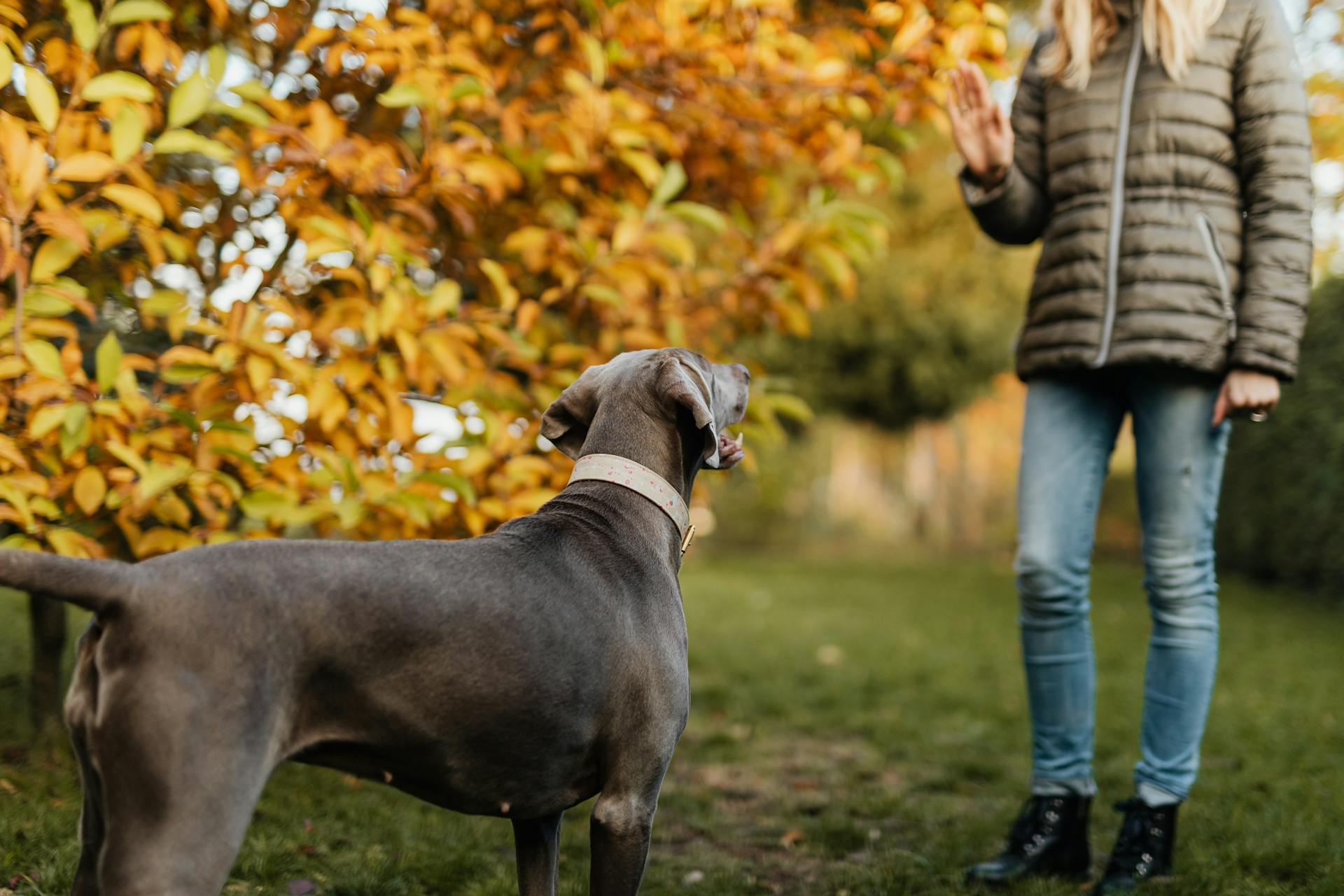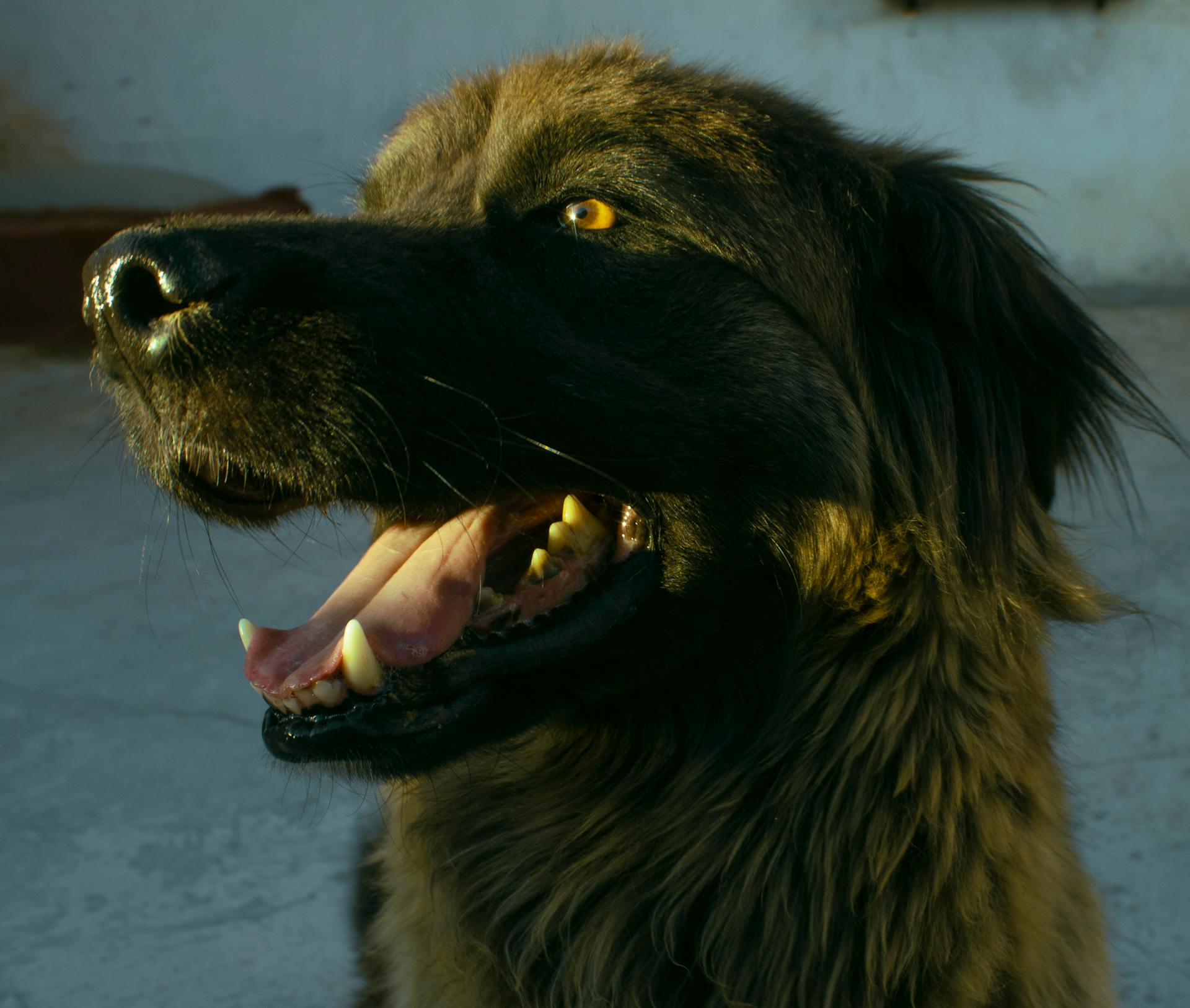
The Boerboel is an impressive breed that can grow up to 28 inches tall and weigh between 110-200 pounds.
Originating from South Africa, this massive dog was originally bred to guard and protect livestock from predators.
Boerboels are known for their short coats, which require minimal grooming and come in a variety of colors including fawn, red, black, and wheaten.
Standing next to a human, a Boerboel can easily appear intimidating due to its massive size and powerful build.
Boerboel Care and Training
The Boerboel is a loyal and lovable companion, but they require early socialization to learn that new people, animals, and situations are not scary or threatening. They need a home with experienced pet parents who will dedicate themselves to socializing and training their Boerboel puppy.
Boerboels can be challenging to manage due to their confident nature and independent thinking. They can put their guard up around strangers, whom they might perceive as a threat.
To help your Boerboel be comfortable in new situations, early socialization and consistent training are vital. This will help them learn to approach new people, animals, and situations with confidence.
The Boerboel's gentle-giant nature and low-maintenance grooming needs can be misleading for first-time pet parents. However, they require a lot of food and space due to their sheer size, which can reach 200 pounds.
Rigorous physical training should start no earlier than 18 months of age, and a complete medical check-up should be done to ascertain the dog's health status. This will help prevent dysplasia and strain injuries.
To train your Boerboel, you should use a firm and strong hand, giving commands briefly and in a clear firm tone. Use the same words for each command to avoid confusion, and accompany commands with gestures so your Boer can obey you even without words.
Here are some key tips to keep in mind:
- Use a calm quiet tone when addressing your dog.
- Reward your dog whenever they obey your directives.
- Avoid punishment, instead use a newspaper or a small twig as a last resort.
An assertive trainer is essential to earn the dog's respect and move forward successfully. However, it's essential to note that an assertive trainer does not connotate an aggressive one, and negative or harsh reinforcement will cause Boerboels to develop a resentful attitude that may result in aggression.
The training of a Boerboel is of critical importance, especially in family situations. They need daily training sessions and consistent commands to develop an obedient nature for the life of the dog.
It's crucial to ensure the proper training and socialization of your pet, and to contact your municipality before getting a Boerboel, as some places may have breed-specific legislation that may affect the legality of owning this dog.
Curious to learn more? Check out: Humane Society Dog Training
Boerboel Temperament and Behavior
Boerboels are not quick to warm up to strangers and can be aggressive towards outsiders and other dogs, especially of the same gender.
They pair great with kids, making them a perfect protecting and caring companion for youngsters.
Boerboels are intelligent dogs that can discern between danger and just a stranger quickly, but they don't attack at random.
With proper training and socialization, they can excel in various roles, including guarding livestock or participating in dog sports.
However, their very confident nature makes them unsuitable for first-time dog owners, and visitors need to be introduced by someone they trust for additional safety.
Boerboels are generally calm at home and gentle with their family members, but they may not be the best fit for homes with smaller children who could be easily harmed by an accidental bump or squish.
Temperament and Intelligence
The Boerboel temperament is a unique blend of confidence and aloofness. They can be easy-going, but also wary of strangers and other dogs, especially of the same gender.
Their protective nature makes them excellent guardians for children, but it's essential to educate kids on how to interact with dogs gently, avoiding poking, tugging, or cruelty, which can trigger an aggressive response.
Boerboels are not known for their intelligence, but they're actually quite smart and can discern between danger and a stranger quickly. They don't attack randomly, which is why they don't have a reputation for aggression.
In the right environment, Boerboels can be lively and free-spirited, but they may be standoffish in new situations. With time and training, they can thrive and excel in various roles, such as guarding livestock or participating in dog sports.
However, their confident nature can make them challenging for first-time dog owners, as they may try to run things themselves. Visitors need to be introduced by someone they trust for additional safety, and even then, Boerboels can be aloof around new humans.
To train a Boerboel effectively, you need to start early with instructions from an experienced dog handler, and be prepared to provide both physical and mental stimulation exercises. They respond well to firm, clear commands and gentle rewards, but may become unsociable and aggressive if not trained correctly.
Here are some key tips for training a Boerboel:
- Give commands briefly and in a clear, firm tone.
- Use the same words for each command to avoid confusion.
- Accompany commands with gestures to help your dog understand.
- Use a calm, quiet tone when addressing your dog.
- Reward your dog with treats or praise when they obey.
- Avoid punishment, especially physical punishment, as it can damage trust.
Bite Force
The Boerboel's bite force is a significant aspect of its temperament and behavior.
As a powerful breed, Boerboels are capable of exerting a substantial amount of pressure with their jaws.
Their bite force is estimated to be between 250 and 350 PSI, which is likely higher than a Pit Bull's due to their larger size.
You might enjoy: South African Boerboel Bite Force
Boerboel Safety and Considerations
The Boerboel's docile and gentle demeanor makes this breed a loyal, lovable companion. However, they need early socialization to help them feel comfortable around new people, animals, and situations.
A home with experienced pet parents is a must for this breed, as they require dedicated socialization and training from an early age.
Boerboels can reach 200 pounds, making them a large breed that needs plenty of food and space. They won't thrive in a small apartment and prefer to have a fenced yard where they can sniff and roam.
Boerboel as Family Pet
The Boerboel can make an excellent family pet, especially if you're willing to put in the effort to socialize and train them.
They're reliable guardians and surprisingly good with children, but it's essential to supervise playtime due to their large size.
A full-grown South African Boerboel has a powerful jaw, so young children should not be left unsupervised with them.
They're generally gentle and patient, making them excellent companions for kids.
However, they can put their guard up around strangers, whom they might perceive as a threat, so early socialization and consistent training are vital.
The Boerboel's gentle-giant nature can be misleading, as they can be challenging to manage due to their confident nature and independent thinking.
To ensure a harmonious household, it's crucial to teach children not to poke or torment the dog for safety purposes.
In return for your dedication and attention, you'll get a loyal and affectionate pet that will bring you and your family much joy.
The Boerboel's large build and powerful jaw require a lot of space and food, so a fenced yard is a must.
You should also be prepared to handle an animal this big confidently and securely, which may require some adjustments to your lifestyle.
Featured Images: pexels.com

